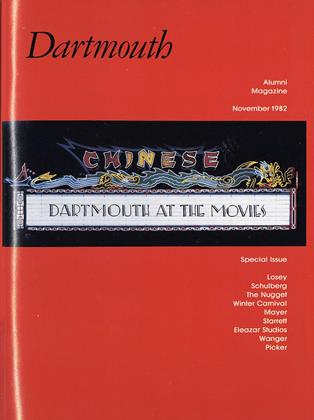THE GENIUS OF WILHELM BUSCH Edited and translated by Walter Arndt University of California Press, 1982. 253 pp. $40.00
Brilliant translator of Pushkin's EugeneOnegin (crowned with the coveted Bollingen Prize), Goethe's Faust, and several volumes of narrative and lyric poetry by Pushkin, Lermontov, Akhmatova, Heine, Rilke, and Morgenstern-Professor Walter Arndt of the Russian Department at Dartmouth College has done it again. This time, the tireless linguistic mediator between European and Anglo-Saxon literary cultures has brought his expertise to bear on the unique creations of a nineteenthcentury German artist of multiple talent: Wilhelm Busch (1832-1908), comic poet, painter, draftsman, and caricaturist.
Arndt's circumspectly edited and beautifully produced book is most welcome as the first sizable collection of Busch's major works in English translation. Long a household name in German-speaking countries and most of Middle Europe, Wilhelm Busch is still virtually unknown in the English-speaking world. This is all the more astonishing since, as the progenitor of the modern comic strip, the least Busch deserves is universal renown. Much to his credit, he invented a new interart genre that combines verbal and pictorial elements into what Arndt terms a "dual art form": the perfect fusion of verse and vignette. By juxtaposing eminently quotable rhymed couplets of aphoristic terseness and acrimonious wit with equally memorable, delightfully grotesque and animated sequential drawings sketched with a few deft strokes, Busch developed his characteristic "picture tales," which won immediate fame on the Continent.
No eloquent description can do justice to the real thing; these wonderful versecum-vignette narratives must be seen and savored in their hilarious totality to be fully believed and appreciated. Text and drawing "in counterpoint" achieve their designed effect only when they are perceived in conjunction. Thus Arndt in his informative introduction is right to condemn the curiously improper practice in The New York Review of Books of embellishing its pages with individual Busch vignettes severed from their verbal counterparts.
The picture tales, essentially burlesque situation comedies played out in the familiar domestic surroundings of everyday bourgeois life, can be enjoyed on many levels. Adult readers will admire Busch's masterful portrayal of every imaginable human foible. A keen observer of society's ills, he pokes serious fun at the hypocrisy of the Catholic church and the double standard in such ordinary social customs as dating and marriage. The Knopp Trilogy (1875—1877), for example, chronicles the insipid life of Mr. Knopp, average burgher of Bismarck's Germany, from bachelorhood through courtship and marital bliss to fatherhood and beyond. Here is a snippet of verse from Knopp, as famous as it is typical, that shows Arndt at his best in capturing the tone, diction, rhyme, and aphoristic quality of the original German: Being father is a thing Tougher far then fathering. Lawful or iniquitous- Fathering's übiquitous; Both the fit and quite unfit Seem to take delight in it. But the wicked sow their surplus For no higher social purpose; When unplanned expenses loom They recoil in fear and gloom And with singular discretion Shun the clerical profession: These, they sense with secret dread, Are the ruthless men who wed. Busch has also been a perennial favorite with children and adolescents who find vicarious pleasure in the ingeniously contrived mischief and calamitous adventures of his endearingly impish child and animal protagonists such as Max and Moritz, the sanctimonious Helen, the bird of evil Jack Crook, and the monkey Fipps. Incidentally, Max and Moritz (1865), Busch's first and most lasting success, served as the model for Rudolph Dirk's celebrated Katzenjammer Kids.
All in all, Arndt's anthology is a treasure house of much delight. In addition to the famous picture tales, it contains a representative sampling of short graphics and vignettes, selected poetry and prose, and a cogent assessment of Busch's serious paintings which in recent years have earned considerable praise in European art circles. The German originals of the translated verse are appended for convenient reference. Thanks to Walter Arndt's mediating effort, recognition will now be accorded in the English-speaking world to Wilhelm Busch, satirist of rare genius comparable only to the immortal Edward Lear and Lewis Carroll.
Steven Scher is professor of German (actingchair of the department) and of comparativeliterature at the College.
 View Full Issue
View Full Issue
More From This Issue
-
 Feature
FeatureThe Credits
November 1982 By Rob Eshman '82 -
 Feature
FeatureThe Hollywood Connection
November 1982 By Maury Rapf '35 -
 Feature
FeatureEvaluating Kitsch
November 1982 By Alan Gaylord -
 Feature
FeatureHelping Sammy Run
November 1982 -
 Feature
FeatureThe Camera Man
November 1982 By James Farley '42 -
 Feature
FeatureThe West That Wasn't
November 1982 By R.E.
Books
-
 Books
BooksTHE TRAGIC ERA
January, 1930 By Charles L. Lingley -
 Books
Books"THE PRESTIGE VALUE OF PUBLIC EMPLOYMENT,"
FEBRUARY 1930 By Charles Leonard Stone -
 Books
BooksSAMUEL BECKETT: POET AND CRITIC.
FEBRUARY 1971 By J. D. O'HARA '53 -
 Books
BooksTHE ROSE BATH RIDDLE
October 1934 By John Hurd Jr. '22 -
 Books
BooksTHERMOSTATICS AND THERMODYNAMICS.
February 1962 By JOSEPH J. ERMENC -
 Books
BooksThe Stuff of Great Fiction
MARCH • 1985 By Young Dawkins '72



